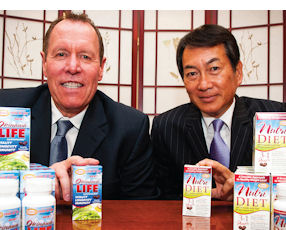The traditional diet on Japan’s subtropical islands of Okinawa was heavy on seaweed, tofu, legumes and sweet potatoes. It also was low in fat, sugar and salt, which has contributed to one of the world’s highest life expectancies – at least before Western foods began taking their toll the last few decades. Now, a 100-year-old Japanese company, Kowa Co. Ltd., is trying to conquer the U.S. health supplement market with pricey products that include key ingredients from the original diet. And as it’s entering a crowded supplement market filled with competitors like L.A.’s own Herbalife Ltd., it’s relying on the expertise of Anthony Raissen, a colorful Valley marketing executive with a long history in direct-response advertising. Kowa Health Care America Inc., the subsidiary of its Nagoya-based parent, has hired Raissen’s InterQuantum Inc., an Encino advertising and retail promotion company, to run a $14-million ad campaign to sell Kowa’s dietary supplements at retail outlets and directly to consumers. The subsidary is run by Chief Executive Tony Hatori. NutriDiet is a weight-loss supplement marketed to 25- to 64-year-old women. The product contains nutrients and probiotics said to be consumed in Okinawa. A second product, Okinawa Life, focuses on longevity and targets men and women older than 50. The ingredient list features shima-tofu, the traditional tofu of Okinawa; a purple ginger-like plant called Zedoary; and a bitter melon called Goya. Kowa Co. is a conglomerate that sells health products along with a variety of other goods, such as cotton and optical equipment. The company reported more than $2 billion in sales during the last fiscal year. One month supplies of NutriDiet are being sold for $39.95 while Okinawa life sells for $34.95 for 150 pills. By contrast, Herbalife, which is considered to have high price points itself, has a suggested retail price of $16.99 for a months supply of its Florafiber digestive aid. Marcia Schurer, president of Chicago food consultancy Culinary Connections, said that while Kowa is entering a crowded supplement market, there is always room for innovative newcomers. But she questioned the pricing strategy. “These products are expensive,” she said. “You might as well go to the grocery store and buy those same fruits and vegetables. My advice to anyone is to do your homework.” Long history Takashi Narusawa, Kowa Health product marketing manager, said that the company settled on supplements because they do not have to go through the U.S. Food and Drug Administration’s time-consuming review process. Kowa’s products are based on a noted 25-year-long study of Okinawans started in 1975 by Dr. Makoto Suzuki. Although higher penetration of fatty Western foods has cut life expectancy, the islands still have an overall life expectancy of 83 years, which is one of the highest in the world. Kowa hired Suzuki and his scientists to develop the supplements, which include prebiotics and probiotics to aid digestion and antioxidants that are supposed to lengthen life expectancy. Narusawa met with several advertising companies, but ultimately chose InterQuantum after discussions with Raissen. “I asked so many questions, hundreds of thousands of questions to get to know the market,” Narusawa said. “And he answered everything.” A South African native, Raissen first achieved direct-marketing stardom in the 1990s with BreathAssure, a mint product that featured ads created by Inter/Media Group, a Woodland Hills advertising holding company that specializes in direct response campaigns. But after a court found that “assure” in the product name was deceitful, it prohibited the company from using the BreathAssure brand and the company declared bankruptcy in 2000. Later, Raissen and his wife Lauren founded InterQuantum, which was purchased in 2007 by Inter/Media. InterQuantum clients include Hollywood 24-Hour Diet and the 48-Hour Miracle Diet, as well as BreathGemz, the mint pitched by ex-radio host Larry King. Retail presence For Kowa, InterQuantum has designed separate websites for each product and has created ads to run on cable TV channels. For Nutri-Diet, the company will target channels such as the Oprah Winfrey Network and Lifetime. Raissen also plans to place ads in publications such as Redbook and Ladies’ Home Journal. To reach the older audience for Okinawa Life, InterQuantum will advertise on Fox News, the History Channel and Biography Channel, as well as on radio. Suzuki serves as the TV spokesperson for both products. InterQuantum released the direct response ads in November and has used the feedback to understand the best way to market the products. GNC stores already carry NutriDiet and plan to carry Okinawa Life by August. NutriDiet will appear on Rite Aid shelves in September, and Okinawa Life will follow early next year, Raissen said. He is in talks to place them in Walgreens, CVS and Walmart stores as well. In August, he will promote the products at the National Association of Chain Drug Stores’ Total Store Expo in Las Vegas. “At the trade shows there are face to face meetings with the retailer for 20 minutes. It’s kind of like speed dating,” Raissen said.
